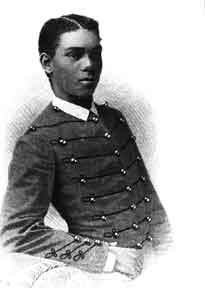1877 FIRST BLACK GRADUATES WEST POINT

Henry Flipper became the first Black to graduate from West Point in 1877. He was later courtmartialed for mishandling company funds. He was later acquitted, but dismissed from the army anyway
Henry Ossian Flipper's name is etched in the annals of American military history as the first African-American graduate of the United States Military Academy at West Point in 1877. This achievement, however monumental, is just one facet of a life filled with triumphs and tribulations, reflecting the racial landscape of the United States during the late 19th century.
Flipper was born in 1856 in Thomasville, Georgia, during an era when the institution of slavery was deeply entrenched. His early life saw the tides of change as he was emancipated following the Civil War. Recognizing the value of education, he attended several institutions, including Atlanta University, before being nominated to West Point.
While West Point has a history of molding military leaders, Flipper's tenure was markedly different due to his racial background. Isolated from his white classmates, he navigated his years at the academy without the camaraderie that many of his peers shared. Yet, his determination saw him excel academically and in military tactics, culminating in his graduation.
Post-graduation, the U.S. Army commissioned Flipper as a second lieutenant, and he was assigned to the 10th Cavalry — one of the renowned "Buffalo Soldier" regiments. His service in the Southwest was multifaceted, where he participated in the Apache Wars and took on crucial roles in surveying and construction.
However, a cloud loomed over Flipper's promising military career. Accusations of embezzlement surfaced while he was serving as an acting assistant quartermaster. The subsequent court-martial in 1881 cleared him of the embezzlement charges, but he was found guilty of "conduct unbecoming an officer and a gentleman." This verdict led to his discharge from the army in 1882.
Flipper's post-military life saw him engage in diverse roles. He served as a civil engineer, translator, and historian, predominantly in the Southwest and Mexico. His expertise was particularly noted in the fields of surveying and the development of water resources.
The legacy of Flipper's life and career underwent a significant transformation in the 20th century. Decades after his passing, a posthumous honorary discharge was granted in 1976. Further recognition came in 1999 when President Bill Clinton issued a pardon, restoring Flipper's military record. This acknowledgment extended to West Point itself, which instituted the Henry O. Flipper Award, recognizing a graduating cadet exemplifying "leadership, self-discipline, and perseverance."
 >
>